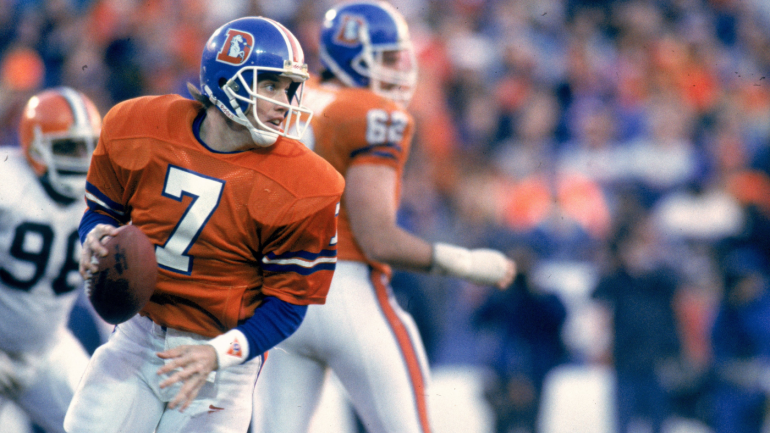
No single-game elimination round in sports has had more classic games than the AFC championship. When the NFL constructed its list of the top-100 games in 2019, eight of those games were played in the AFC championship. Classic AFC title games that did not make the list included Pittsburgh's win over Oakland in the 1975 "Ice Bowl II," the Patriots' nail-biting win over the Ravens in 2011, the Broncos' two-point win over the Patriots in 2015, and Tom Brady's comeback win over the Jaguars in 2017.
Those classic games (and others) have been lost in the shuffle of great AFC championship games. A common theme in these games has been elevated quarterback play from some of the greatest passers in NFL history. Specifically, Brady, Peyton Manning, and John Elway contributed to their legacies as all-time greats by what they did in AFC championship games. This trio played in a combined 24 AFC title games, with four of those games earning a spot on the list of the five greatest AFC championship games ever played.
Honorable mention
1995: Steelers 20, Colts 16
Trailing 16-13, the favored Steelers took the lead after Ernie Mills' 37-yard catch set up Bam Morris' one-yard touchdown run. Pittsburgh's defense then had to withstand a last-second Hail Mary by Jim Harbaugh. Harbaugh's pass was nearly corralled by Aaron Bailey, who cradled the ball in his chest before it touched the turf. The win made 38-year-old Bill Cowher the youngest coach to take his team to a Super Bowl.
5. Bengals 27, Chargers 7 (1981)
This wasn't necessarily a great game, but how well the Bengals played -- specifically quarterback Ken Anderson -- in sub-freezing temperatures is what made this AFC title game memorable. In a game that was tabbed as "The Freezer Bowl," Anderson threw two touchdowns while leading the Bengals to their first Super Bowl. Anderson's passer rating was more than twice the amount of his counterpart, Hall of Fame quarterback Dan Fouts, who a week earlier helped lead the Chargers to an epic double-overtime win over the Dolphins in balmy Miami.
"Kenny's advantage was that he threw tight spirals," said Fouts, who said that throwing that day was like "throwing a shoebox in the wind."
"I didn't always throw spirals," Fouts said. "In my mind, that was the biggest part of us losing the game."
No. 67: 1981 AFC Championship Game - Chargers vs. Bengals "The Freezer Bowl" (Jan. 10, 1982) #NFL100 @Bengals
— NFL (@NFL) September 28, 2019
📺: NFL 100 Greatest Games on @NFLNetwork pic.twitter.com/Bs6uikSiU2
4. Patriots 37, Chiefs 31 (2018)
Brady's ninth AFC championship game win came at the expense of Patrick Mahomes, who this Sunday will look to lead the Chiefs to their second consecutive conference title. The Chiefs' AFC championship tally would already be at two if not for Brady, who led the Patriots' offense on a 13-play, 75-yard drive in overtime that was capped off by Rex Burkhead's two-yard touchdown run.
Moments earlier, Brady had been bailed out by Dee Ford, who was ruled offsides on the play that saw Brady throw an interception to Charvarius Ward. On the ensuing play, Brady found his longtime partner in crime, Rob Gronkowski, open for a 25-yard gain. The completion set up the Patriots' go-ahead touchdown, which was countered by Harrison Butker's game-tying field goal with 11 seconds left in regulation.
Brady eschewed his running game for most of the Patriots' game-winning overtime drive. He threw eight consecutive passes, the final one a 15-yard completion to Gronkowski. The completion set up Burkhead's second touchdown of the night, as the Patriots left Arrowhead Stadium with their fourth AFC title over a five-year span. Brady's performance overshadowed Mahomes, who threw three touchdown passes in his AFC championship game debut.
No. 36: 2018 AFC Championship - Chiefs vs. Patriots (Jan. 20, 2019) #NFL100 @Patriots
— NFL (@NFL) September 28, 2019
📺: NFL 100 Greatest Games on @NFLNetwork pic.twitter.com/D9JWNhyBV4
3. Broncos 38, Browns 33 (1987)
After a heartbreaking AFC title game loss to the Broncos the previous year (more on that later), the Browns were trying to play the role of spoiler late in the rematch. Cleveland's comeback was spearheaded by quarterback Bernie Kosar and running back Earnest Byner. On their final drive, the Browns appeared to be on the verge of tying the game after driving inside the Broncos' 10-yard-line.
With their season on the line, Cleveland ran a draw for Byner, who found space on the right side of the defense. While Byner initially appeared to score the game-winning touchdown, Browns fans were immediately sucker punched after realizing that Byner had fumbled the ball two yards short of the end zone. The Broncos recovered Jeremiah Castille's forced fumble, and were on their way to Super Bowl XXII.
The fumble overshadowed an epic performance from Byner, who scored two touchdowns and gained 187 all-purpose yards. Byner would end up winning a ring with Washington in 1991. The Browns, however, are still waiting for their first trip to the Super Bowl.
No. 22: “The Fumble” - Browns vs. Broncos 1987 AFC Championship Game (Jan. 17, 1988) #NFL100 @Broncos
— NFL (@NFL) October 5, 2019
📺: NFL 100 Greatest Games on @nflnetwork pic.twitter.com/qi0SnjMGms
2. Colts 38, Patriots 34 (2006)
After recent playoff losses to the Patriots, the Colts found themselves staring at a 21-3 deficit midway through the second quarter of the 2006 AFC Championship Game. But following Asante Samuel's 39-yard pick-six of Peyton Manning, the Colts scored the game's next 18 points that included a touchdown pass from Manning to lineman Dan Klecko. The Patriots went back ahead before another Colts lineman, center Jeff Saturday, tied the score after pouncing on a fumble in the end zone.
Trailing 34-31 with 3:49 left, two completions from Manning to Reggie Wayne sandwiched Manning's 32-yard completion to Bryan Fletcher. Fletcher, a seldom-used tight end, had lobbied for Manning to look his way earlier in the game. After reaching the Patriots' 11-yard-line, Manning called three straight runs for rookie running back Joseph Addai. Addai's third carry resulted in the go-ahead touchdown with 1:02 left.
Brady, whose late-game prowess was already legend by this point, passed his team beyond midfield before throwing a game-ending interception to cornerback (and fellow Michigan Man) Marlin Jackson. The Colts would go onto win their lone Super Bowl with Manning under center. In Denver, Manning would win two more AFC title games against the Patriots while retiring with a 3-1 record against the Brady/Belichick Patriots in conference championship games.
No. 21: “Peyton’s Revenge” - 2006 Patriots vs. Colts AFC Championship Game (Jan. 21, 2007) #NFL100 @Colts
— NFL (@NFL) October 5, 2019
📺: NFL 100 Greatest Games on @nflnetwork pic.twitter.com/DUnz8hsUVD
1. Broncos 23, Browns 20, OT (1986)
The 1980s Browns lost three AFC title games in a four-year span to the Browns. While each loss was painful, the first one was undoubtedly the hardest to swallow.
With the score tied at 13, Bernie Kosar's 48-yard pass to Brian Brennan gave the home team a 20-13 lead. After watching its defense surrender the big play, Broncos fans watched in agony as their special teams botched the ensuing kickoff before jumping on the ball at their own 2-yard-line. John Elway, displaying the savvy that would eventually put him in the Hall of Fame, meticulously moved the ball against the Browns' stingy defense.
After a short throw and two runs gave the Broncos a first down, an 11-yard run by Elway and a 22-yard completion to Steve Sewell got Denver near midfield. On third-and-18 on the Browns' 48-yard-line, Elway stood tall before firing a 20-yard dart to Mark Jackson. The Broncos avoided a disaster on the play, as Elway was about to catch the shotgun snap after it incidentally hit a receiver in motion.
Two plays later, a screen pass to Sewell got the Broncos to the Browns' 14-yard-line. Three plays later, facing a third-and-one on the Browns' 5-yard-line, Elway took the shotgun snap, waited for Jackson to break free from his defender, and threw a dart that Jackson was able to corral in the end zone. The score, which came with 32 seconds left in regulation, capped off what is known in NFL history as "The Drive."
In overtime, Denver's defense quickly gave the ball back to Elway, who got the Broncos past midfield on a 22-yard completion to tight end Orson Mobley. After losing two yards on the next two plays, Elway started to run, which formed Denver's defenders to move up to honor him. But before crossing the line of scrimmage, Elway stopped, then hit an open Steve Watson, who caught the 28-yard pass before falling out of bounds. The play set up Rich Karlis' game-winning field goal, as Elway and the Broncos were on their way to Pasadena for Super Bowl XXI. It was the first of five Super Bowl appearances for Elway, who lost his first three Super Bowls before retiring with back-to-back titles.
No. 11: “The Drive” - 1986 Broncos vs. Browns AFC Championship Game (Jan. 11, 1987) #NFL100 @Broncos
— NFL (@NFL) October 5, 2019
📺: NFL 100 Greatest Games on @nflnetwork pic.twitter.com/BJBLHMR7Xl
















